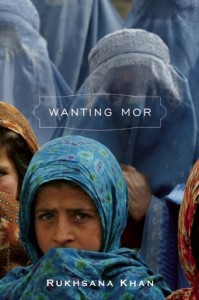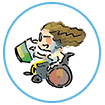 Summary: When her mother dies, Jameela and her father move quickly to Kabul, Afghanistan, where her father remarries. His new wife doesn’t like Jameela, and convinces him to abandon her in the marketplace. Taken in by a kindly butcher and his family, Jameela makes new friends until they send her to an orphanage because they can’t take on the responsibility of another dependent. It turns out though that the orphanage is the best thing to ever happen to Jameela because there she is educated and appreciated, plus a surgeon from the American army fixes her cleft lip. Circumstances conspire for Jameela to cross paths with her father again, but this time it is up to her to decide the nature of their relationship.
Summary: When her mother dies, Jameela and her father move quickly to Kabul, Afghanistan, where her father remarries. His new wife doesn’t like Jameela, and convinces him to abandon her in the marketplace. Taken in by a kindly butcher and his family, Jameela makes new friends until they send her to an orphanage because they can’t take on the responsibility of another dependent. It turns out though that the orphanage is the best thing to ever happen to Jameela because there she is educated and appreciated, plus a surgeon from the American army fixes her cleft lip. Circumstances conspire for Jameela to cross paths with her father again, but this time it is up to her to decide the nature of their relationship.
Number of Pages: 192
Age Range: 13-14
Review: I love the title of Rukhsana Khan’s Wanting Mor because of it has a double meaning. Yes, Jameela is wanting Mor, her mother, grieving her loss and the way her life changed so drastically after her death, but it is also about Jameela wanting and deserving more from her life. Born with a cleft lip and abandoned by her father in Kabul, Jameela must rely on the kindness of others to survive. An intelligent and hard worker, Jameela revels in the opportunity she gets to be educated, and becomes an instructor so she can support herself in the future. She is a kind person who surpasses the many obstacles placed before her. In some ways, her story is a little like Jane Eyre.
All throughout Khan’s book is a thread of spirituality and religion. Jameela is a follower of Islam living in Afghanistan where woman are encouraged to cover themselves with Chadors and Porani, and those that don’t cover up adequately are subjected to sexual abuse. In Jameela’s case, at first she seems mainly to use a Porani (a head scarf that can also cover part of a woman’s face) to hide her cleft lip and because her mother taught her to. When her cleft lip is fixed, her use of a Porani and then a Chador (full covering from head to knees with a mesh screen for the wearer’s viewing purposes) become more a symbol of her faith, and a deterrent for unruly men. After years of having a cleft lip, I’m sure the attention she received when it was fixed was startling, and I can see why she would want to protect herself.
I enjoyed Khan’s book because it was a completely different perspective for me. It’s easy to see Chadors as being oppressive in our Western culture, but I didn’t feel like Jameela was oppressed while wearing it. Instead, it seemed to give her a sense of power, confidence, and invisibility. Given all she had been through in her life, it was easy to see why that would be appealing to her. It was an enlightening and educational read.
Memorable Quotes:
“Mor was wrong. Being good isn’t enough. You have to be beautiful or at least rich.
And despite the Prophet’s advice (peace be upon him), I am angry. So angry I’m trembling.
The tears flow, and for once I can’t stop them. They’re so hot they could burn me. They make my pillow damp. Some even trickle into my ear.
I try to muffle my sobs. I don’t want to wake Soraya. I don’t want to talk about it. I just want to forget.
And when my eyes are all puffy and swollen and I just can’t cry any more, what has changed? What have I solved? Nothing. Anger is for people who can do something about it.” – Jameela from Wanting Mor by Rukhsana Khan, page 70
Wanting Mor by Rukhsana Khan is published by Groundwood Books, (2009).




 Amy Mathers has been passionate about reading from a very young age, and hopes others will share her enthusiasm for funding a teen book award.
Amy Mathers has been passionate about reading from a very young age, and hopes others will share her enthusiasm for funding a teen book award. 





